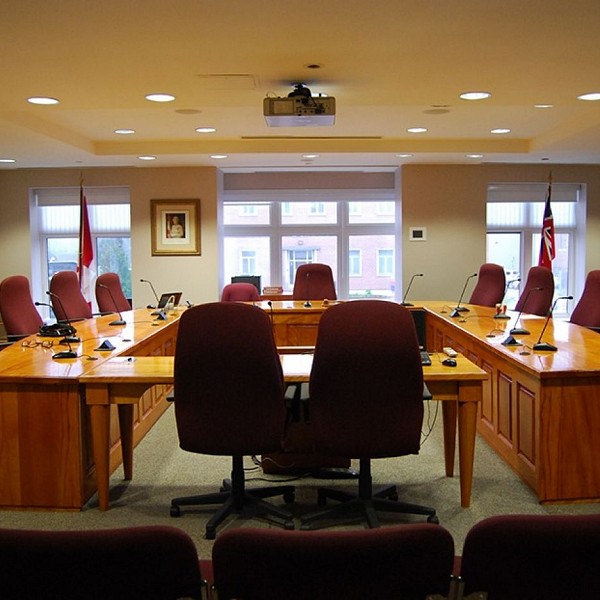The MNR addresses increase in bear population in Huntsville General meeting
The Ministry of Natural Resources (MNR) addressed the increase in the bear population in the Huntsville General meeting, on September 25, 2024.
Upon invitation by the Town, MNR Provincial Co-ordinator for Human-Wildlife Management, Micheline Mamone, advised Council that food is the primary reason for the increase in the number of bears in the urban area.
Micheline explained that bear population increases and decreases are based on the natural food supply available, such as berry bushes, acorns, beechnuts and other food derived from their natural habitat. Lack of food supply drives them to alternative food sources, such as garbage, fruit trees, and bird feeders.
She said, “Commercial waste is a large draw of bears to the Huntsville area.”
She added that bird feeders can be a valuable food source as well. She explained, “7 pounds of black oil sunflower seeds has 20,000 calories.”
Preventative measures recommended by Mamone include picking fruit from trees once ripe or avoid having the trees altogether, putting bird feeders out after bears have hibernated until they awake, as birds have plenty of food sources during the summer, such as bugs and seeds, and ensuring garbage is locked using either metal lids or bear proof containers and is put out the morning of pick up (rather than left on the curb overnight).
She also advised Council that they can develop a By-law for waste management at food establishments, with the help of the MNR, to help prevent risks.
According to the MNR report, Black Bear safety includes knowing the difference between emergency and non-emergency situations.
They indicate that emergency situations involve a bear at your door or window or trying to enter a facility or residence, being in a schoolyard during school hours, stalking people, lingering, displaying aggressive behavior, or killing livestock or pets. The MNR advises to call 911 or local OPP, who will contact them during daytime hours only if necessary.
A non-emergency situation involves a bear roaming or checking garbage cans, breaking into a shed where there is food or garbage, is in a nearby tree, pulls down a bird feeder or knocks over a barbecue. It may move through a backyard or field but doesn’t linger. The MNR has a Bear Wise reporting line for these instances, so they can monitor activity, which is 1-866-514-2327.
Mamone also advised that there are two types of bear behaviors people should be aware of, which is defensive and predatory.
She advised that defensive behavior is when a bear may feel unsafe or threatened. For instance, despite common myths, a bear standing on its hind legs means it’s curious and does it to scan the area better and sniff. Other defensive behaviours may include yawning, excessive salivation, huffing, moaning, clacking or popping sounds with its mouth, inhale and exhale, and swat the ground.
She said, “This is a bear telling you that you are too close, and it would like you to please back up and give it more space.” She added, “Noisy is not dangerous as long as you give it space.”
A predatory bear is “extremely rare” and primarily occurs in rural or remote areas said Mamone. This bear quietly and persistently pursues and will continue to approach regardless of attempts to deter it, such as making loud sounds or throwing rocks. She added, “It may retreat with bear spray but return and continue to approach.”
She added that there have only been a few of these incidences in North America, which includes all bear species, with “one to three attacks per year.”
To reduce conflicts, the MNR advises taking precautions when encountering a bear. Mamone said, “Stop. Calmly alert the bear to your presence, clap your hands, ‘hey bear’ in a calm voice, and slowly back away, while watching the bear and wait for it to leave.”
She added that people can attempt to intimidate it to move away by throwing objects, waiving your arms or making noise, such as your car alarm, air horn, or a whistle, but don’t pursue it and “keep your personal safety in mind.”
Other MNR suggestions include never run, climb a tree, or try to swim away. Bears are faster said Mamone, adding, “faster than an Olympic sprinter.” Also, don’t kneel, make direct eye contact, get closer, feed it, or unleash your dog.
Mamone adds that if your dog is off its leash and aggravates a bear it puts you at risk if you’re near your dog.
The MNR also advises to never play dead, unless you’re attacked by a mother bear with her cubs.
They indicate that communities can co-exist with black bears provided there is education, awareness, responsibility with waste management, and encounters are adequately addressed.
Councillor, Bob Stone, asked if the bear hunts have “a bearing on the numbers.”
Mamone said, “We don’t see that affect the amount of human-bear conflicts that are experienced in the area.”
She added, “The most explanatory factor that can explain increases or decreases is the amount of natural foods on the landscape.”












